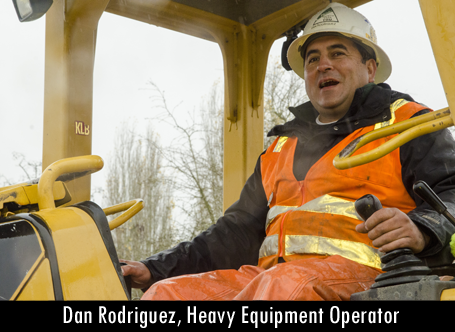Dan Rodriguez: A heavy equipment operator who lives lightly
Dan Rodriguez says he’s pretty happy having spent the past 23 years being, as he likes to call it, “a dirt hand.” After meeting the guy, you tend to believe him – he’s led quite a life mastering the art of operating heavy equipment.
The expert dozer and scraper operator has his father to thank for his well-suited career – his dad suggested Rodriguez sign up with Local 701 Operating Engineer Union for heavy equipment operator training decades ago, after Rodriguez had spent his first five post-high school years indoors at a machinist shop.
“I learned I actually liked the smell of diesel engines and working with dirt,” the Klamath Falls native tells us.
Young Rodriguez moved to Eugene for his first trainings with Operating Engineers Local 701 – the first journey in a career that would bring a lot of traveling for the small town boy. A short time later, he wound up moving again. This time, it was to Boardman, Oregon, where he completed his pre-apprenticeship training. At the time, Rodriguez was working as an oiler. (It was several years before he “got into the seat.”)
Those first few days in Boardman, Rodriguez realized that education would be an ongoing process in this line of work. “They put me on a job where I was responsible for maintaining and greasing the plant and the equipment,” he says. “I had to figure out so much that at first, it took me 19 hours to get it all done. But I stuck with it, and later I was able to complete all the work in six hours.”
After putting in time as a crane oiler at Bonneville Dam, Rodriguez went to work for Kiewit Construction, where he spent 15 years. It took him six or seven years to complete his apprenticeship there, but he didn’t mind – the important thing was that he was staying busy. Three mentors took him under their wing and made sure he was consistently employed and accumulating new experience. They kept moving him from job to job and place to place, picking up new skills as he went along.
Those kinds of valuable connections with coworkers, Rodriguez learned, meant a lot when jobs lead to days and weeks away from home, staying in temporary living arrangements that afford you moments to really connect with your fellow workers.
“We get to talking, and, of course, we can’t help it,” Rodriguez reflects on these off-the-clock moments. “Pretty soon, we’re talking about this or that about our jobs. That’s been a great way to learn.” His work has led him to bunk down in a Lakeview, Oregon “man camp”, his own motor home for many years, in Astoria, and eventually, in Hawaii for a lifechanging three-year stint.
There’s something to be said for island living. “In Hawaii, I really learned a lot about working with people from many different cultures,” says Rodriguez. “It was a real adjustment getting used to the pace of work and life there.” He learned that he could “chill out a little” and still get his work accomplished, sans stress.
During his career, Rodriguez has moved from oiler to operator to crew chief to foreman – he’ll take the lead job when it’s requested — but he prefers “being in the seat.” “There is more to life than just working all the time,” says a man who prefers to spend his off hours with his girlfriend and her child over worrying about his career.
“Travel is a part of the life,” Rodriguez likes to say. His ability to adapt to new ways of doing things continues to serve him well in his professional life. “Each company has a different culture, too” he says. “For instance, one place really put a high value on keeping the equipment and vehicles clean and maintained. But at another outfit, they didn’t expect you to spend your time on much of that. They just assumed you’d be pretty rough on the equipment if you were really getting out there and working hard on your job.”
There is one consistent priority — safety. “You learn about safety every day,” he says. “Especially when people are operating big machines alongside of you, right next to your feet.” Rodriguez should know – he’s logged 25,000 workplace hours without an accident, advising new workers to be cautious because it can be easy to misjudge hazards when operating heavy equipment.
Advice to new workers from an old dirt hand? “Help others and along the way, never forget where you came from – that you were new once and everybody is always learning something.” Rodriguez adds his bottom line with a smile: “do the best job you can, but it’s okay to chill out a little too.”

I liked the article because I’m interested in becoming a “dirt hand”. I am a junior in high school and I live in a small town. The information helped me get a better idea of the job. I plan to enter Wisconsin’s apprenticeship program as soon as I graduate in the spring of 2015.
interesting sharing….
Excellent explanation. Anyone can easily comprehend since it’s simple & focused. Keep up the great work!